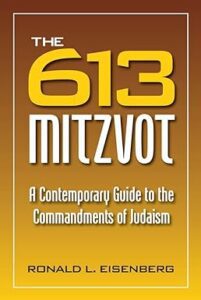Chapter 15.
The History and Threat of Christian Nationalism
Christianity is the largest of more than four thousand religions worldwide. Approximately 2.4 billion people identify as Christians, representing about a third of the world’s population. The Christian religion has more than 200 denominations in the United States and a surprising 45,000 denominations globally according to estimates by the Center for the Study of Global Christianity. The American Christian denominations are usually divided into three large groups: mainline Protestantism, evangelical Protestantism, and the Catholic Church. Additionally, there are some much smaller Christian denominations in the United States, among them, Eastern Orthodoxy and Oriental Orthodoxy.
In this chapter, I discuss how American Christianity evolved during the 20th century and how it is perceived today. You may be surprised by how world events, politics and social trends have shaped this religion, and continue to do so to this day. The sections are as follows:
-
- The Changing Landscape of American Christianity
- White Evangelicals: A Bible-Based Movement
- Christian Nationalism: A Massive Movement to Overthrow Democracy for a Theocratic Patriarchy
- More Christian Nationalist Propaganda: The Lie that “America is a Christian Nation”
- Organizations Counteracting Christian Nationalism
- A Closing Thought on Christian Nationalism
The Changing Landscape of American Christianity
In this section, I present results from two surveys of American religiosity.
2024 Pew Research Center Survey
The growth of the unaffiliated, religious Nones is remarkable. They are the single biggest “religious” demographic in the U.S., as well as the fastest growing one. Based on a 2024 Pew Research Center survey, 56% of religiously unaffiliated respondents believe in a spiritual force or higher power distinct from that described in the Judeo-Christian Bible.
2006-2020 Public Religion Research Institute (PRRI) Survey
In 2021, a major study on U.S. religion was completed by the Public Religion Research Institute (PRRI) (PRRI 2020 Census of American Religion). Their survey looked at the trends during the fifteen-year period ending in 2020.
In comparing the percentages of change in religious affiliation among a range of Americans, the survey found substantial stability among Christians of color and non-Christian religious groups. In contrast, among white Americans, the changes in religious affiliation were dramatic. Among whites, Christianity in the U.S. has been experiencing a steady decline to only 42.6% of the U.S. population in 2020.
The survey reported on the percentage of white Americans who self-identified as one of the following four groups: white evangelical Protestant, white mainline (non-evangelical) Protestant, white Catholic, and unaffiliated groups. The unaffiliated, also called Nones, showed a dramatic increase. The increased percentage of those identified as Unaffiliated came at the expense of the three white Christian groups, which all showed membership declines.
The following table shows how these four groups performed based on this 15-year survey:
| Group | Percentage of 2006 U.S. Population | Percentage of Change Within Group | Percentage of 2020 U.S. Population |
| White evangelical Protestant | 23% | -37% | 14.5% |
| White mainline (non-evangelical) Protestant | 17.8% | -8% | 16.4% |
| White Catholic | 16% | -27% | 11.7% |
| Unaffiliated (Nones) | 16% | +46% | 23.3% |
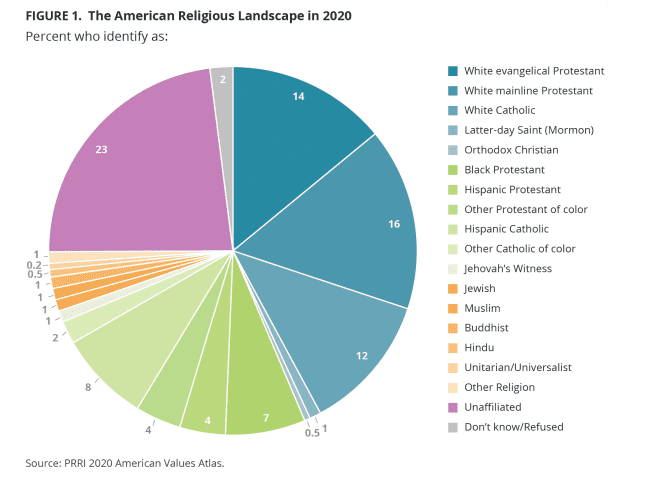
White Evangelicals: A Bible-Based Movement
The Public Religion Research Institute (PRRI) focused on white evangelicals in its 2020 survey, perhaps partly because of the political influence that this group now wields. White Evangelicals, whose numbers fell only slightly between 2006 and 2020, have become a politically active and polarizing force in American politics and society. Though in 2020, only 14.5 % of Americans were white evangelicals, they accounted for 18% of registered voters. It would be helpful to briefly address how this group originated and what they represent.
Though white evangelicals may self-identify as faith-based, they hold a rigid, fundamentalist adherence to their interpretation of the Bible. Their biblical interpretations often emphasize the Old Testament, rather than the messages of Jesus from the New Testament.
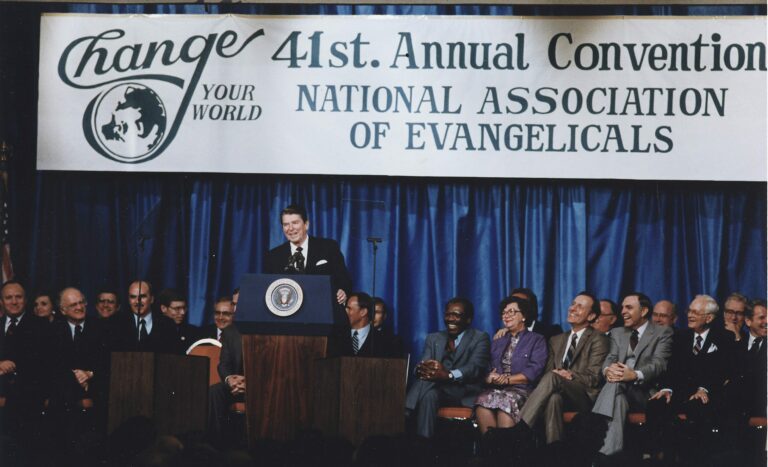
Evangelical theology has its roots in 18th century Protestantism. However, I begin here with the early 20th century, when the Fundamentalist movement was dominant in American Evangelicalism. These Fundamentalists embraced the inerrancy of the Scriptures and rejected liberal theology. In 1942, the National Association of Evangelicals was formed in St. Louis. It consists of evangelical denominations, organizations, churches, schools, and individuals. Today it represents over 45,000 local churches from 40 different denominations. Members define themselves according to four evangelical directives: upholding the Bible as one’s ultimate authority, confessing the centrality of Christ’s atonement, believing in a born-again conversion experience, and actively spreading the good news and reforming society accordingly.
Post World War II: the Rise of Billy Graham
The U.S. involvement in World War II, triggered by the bombing of Pearl Harbor by Japan, fostered militancy in America. Two years after the war ended, the Cold War began, launching a decades-long period of hostility between the Soviet Union and the Western powers. This antagonism went beyond the strain between communism and capitalism. The Soviet Union had an atheistic ideology which was diametrically opposed to Christianity.
It was during this time that a young Southern Baptist minister, Billy Graham, was becoming prominent among evangelicals. Historian George Marsden once remarked that the simplest definition of “evangelical” might be “anyone who likes Billy Graham.” Standing six feet two inches tall, he was the “All-American male …with a craggy face, blue eyes, square jaw,” quipped Marsden. Graham lifted weights and jogged in preparation for his crusades. He used both military and athletic metaphors to describe Jesus—a “star athlete.” Jesus was “Our Great Commander” and the Christian life was “total war.” He went on to become recognized as America’s Protestant patriarch.
Despite his conservative beliefs, Graham was an early supporter of racial integration. He could not understand segregation in the church. In 1952, before a crusade in Mississippi, he pulled down ropes that had been erected to keep blacks and whites apart. He determined that he, “would never preach to another segregated audience.” In 1993, he wrote, “Racial and ethnic hostility is the foremost social problem facing our world today.”
Graham threw his support behind General Dwight D. Eisenhower, who ran for and was elected president in 1952. Eisenhower asked Graham to help him select Bible verses for his inaugural address. Graham was very active in politics, providing spiritual counsel to every president from Harry S. Truman to Barack Obama. In addition to Eisenhower, he was particularly close to Lyndon B. Johnson and Richard Nixon. At one of his crusades, Graham proclaimed “There is no American I admire more than Richard Nixon.”
Graham supported the Cold War and the Vietnam War. He encouraged Nixon that, if the Paris peace talks were to fail, he should bomb the dikes in North Vietnam because it would “destroy the economy of North Viet Nam.” Graham was quite vocal about the communist threat: “Communism is a religion that is inspired, directed and motivated by the Devil himself who had declared war against Almighty God … Communism was the greatest enemy we have ever known.”
Graham believed that stability of the home was essential to both security and morality, “A nation is only as strong as her homes.” He believed that women must submit to their husband’s authority, a man was “God’s representative,” the spiritual head of the household. Men were to provide for the family and defend the nation, while women were deemed defenseless and in need of protection.
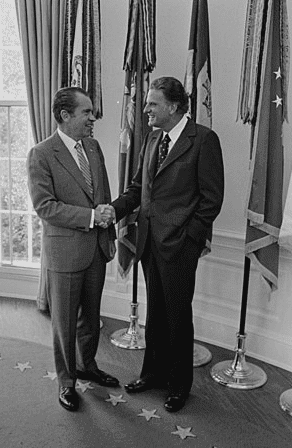
Evangelicals began to build a powerful media empire along with a network of institutions and organizations that prospered outside of denominational structures. Graham helped found Christianity Today, the leading magazine of American evangelism. Nearly 700 radio stations carried his programs around the world. Today, the evangelical marketplace is served by online retailers such as Lifeway and Christianbook.com.
Graham was one of the most influential men in the 20th century and has been on Gallup’s Top 10 “Most Admired Man” list 61 times. It is hard to imagine anyone who has received more awards than Billy Graham.
The Impact of the 1960s
The 1960s was a time of great social and political upheaval. It was a decade of revolution in social norms affecting sexuality, music, formalities, clothing, drugs, and among many, an anti-war attitude about U.S. involvement in Vietnam. The evangelicals saw it as a time of decay of social order.
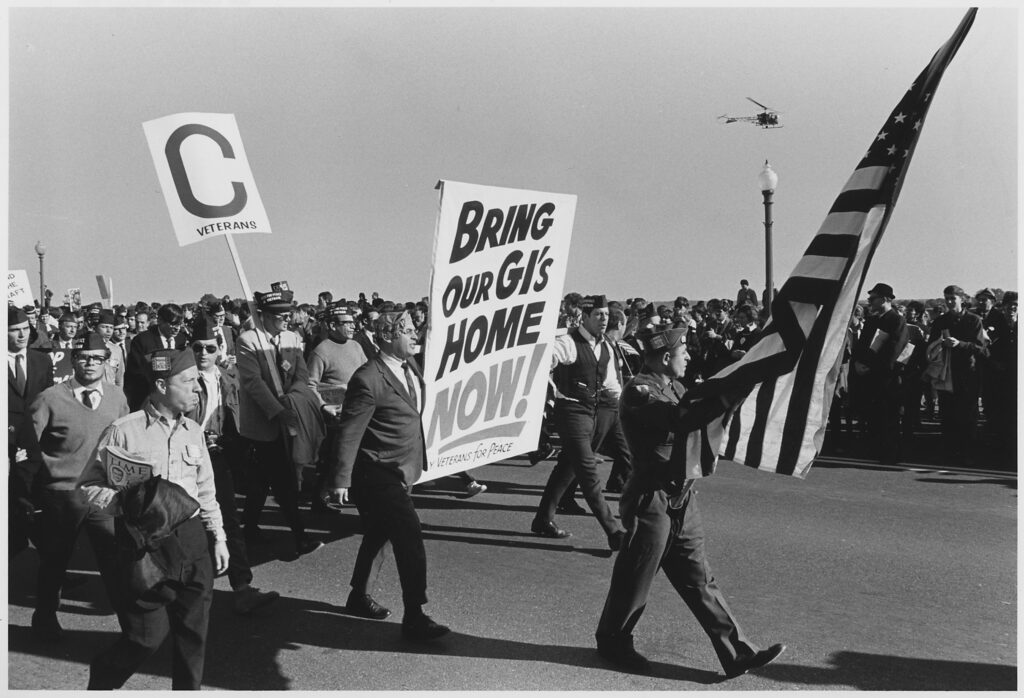
The Vietnam War was central to the formation of a rising evangelical identity. For many Americans growing up in the 1960s and 1970s, Vietnam eroded the belief in America’s goodness and greatness. Evangelicals, however, saw this quite differently: what led to this catastrophe was a lack of American power. A 1968 poll showed support for continued bombing and an increase in U.S. Military intervention among 97% of Southern Baptists and 91% of independent fundamentalists.
Throughout this revolution in social values, evangelicals held onto the belief that America was a Christian nation, that military force was good, and that the nation’s strength depended on a proper patriarchal home. In the seventies, they responded to changing societal norms with a resurgence that united evangelicals around “family values.” The reassertion of white patriarchy was foremost to the emergent “family values” politics. Graham regarded homosexuality as a sin, in 1974, characterizing it as “a sinister form of perversion.”
John Wayne as Conservative Icon
If evangelicals could be defined as anyone liking Billy Graham, by the 1970s, a conservative might be described as somebody who loved John Wayne. He appeared in 179 film and television productions and was selected by the American Film Institute as one of the greatest male stars of classic American cinema. He was an icon of rugged American manhood and Christian masculinity for generations of evangelicals.
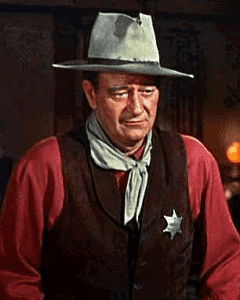
As a movie star, Wayne was the embodiment of the idealized American soldier and heroic cowboy. Evangelicals admired him for his swagger and toughness; he protected the weak and nothing got in his way of ensuring justice and order. Violence was pervasive in his western films and even more so in his war films. Baptist scholar Alan Bean once remarked, “The unspoken mantra of post-war evangelicalism was simple: Jesus can save your soul, but John Wayne will save your ass.”
Wayne was an outspoken conservative and activist in real life. From 1949 to 1953, during the height of McCarthyism (the hunt for Communists in the government and public life), Wayne presided without compensation over the Motion Picture Alliance for the Preservation of American Ideals. The Alliance sought to uphold “the American way of life” in films, as well as protect cinema from “communists and fascists”.
In support of the U.S. Army, Wayne directed and starred in the 1968 film The Green Berets; this was the only movie that was in favor of the Vietnam War. It was a make-believe alternative for the actual war.
In a 1971 interview in Playboy Magazine, Wayne stated, “I believe in white supremacy” and referred to the film Midnight Cowboy as “a story about two fags.”
Militant Evangelical Masculinity
The cult of militant masculinity is mainly the creation of white evangelicals. It does not represent the whole of American evangelism. The overwhelming majority of black men, Hispanic men, and Middle Eastern men are not drawn to militant masculinity.
The culture of militant evangelical masculinity goes together with fear—the opposite of love. Generations of white evangelicals have been taught to be afraid of communists, feminists, secular humanists, liberals, homosexuals, the government, non-white people, immigrants, Muslims, and the United Nations. They are currently active in influencing government policy in favor of abortion restrictions and against LGBTQ anti-discrimination protections.
Christian Nationalism: A Massive Movement to Overthrow Democracy for a Theocratic Patriarchy
“One of the most powerful, secretive early Christian Nationalist organizations represented an American past dominated by white Protestant male property owners. They dreamed of restoring a nineteenth-century patriarchy that limited the civil rights of women, minorities, immigrants, and workers, with no income tax to vex the rich or social safety net to aid the poor.” — Anne Nelson, author of Shadow Network: Media, Money, and the Secret Hub of the Radical Right (2019)
The formal origin of Christian Nationalism is likely the National Association to Secure the Religious Amendment of the United States Constitution (1864) created to make the U.S. a Christian state. Today, the Christian Nationalism movement is headed by hyper-wealthy families, a new elite. They reject our democratic government and are using the government to overthrow itself for a theocratic government.
It is a massive unified operation. Its high-end data-mining operations and slick marketing campaigns were instituted many decades ago. Nelson’s Shadow Network lists eighteen organizations run by members of its umbrella organization. She also lists six organizations connected to a major network, four donor networks, and seven strategy and tech companies. In addition, three key players own media outlets and radio networks used in the operations.
The social scientists who have researched one part of this network wrote that it employed more than three times as many people than the Republican committees had on their payrolls in 2015:
Pushed by relatively small numbers of radical right billionaires and millionaires …[they have] been working to undermine the normal governance of democracy. Indeed, one such manifesto calls for a ‘hostile takeover’ of Washington D.C.…Their agenda includes measures calculated to kill off unions, keep millions of people from voting, privatize everything from schools to highways to Medicare and Social Security, stop any action on climate change—and transform the legal system and amend the Constitution to lock all of this in place permanently. (Nancy MacLean, Democracy in Chains: The Deep History of the Radical Right’s Stealth Plan for America, 2017)
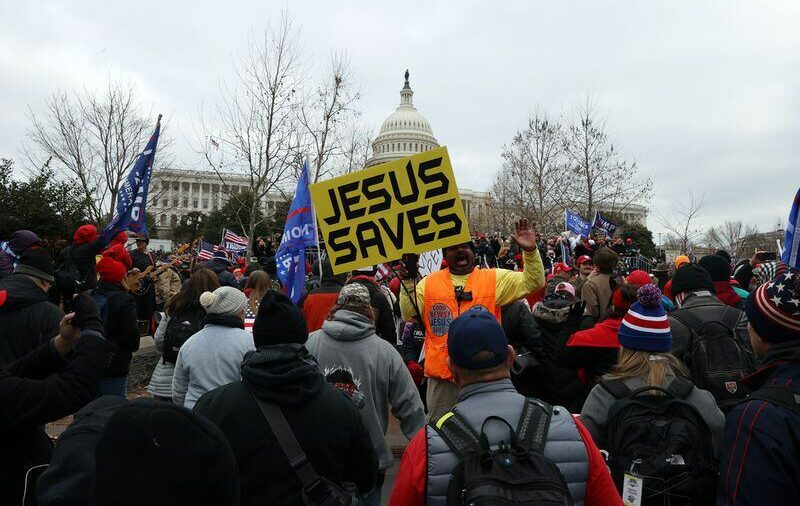
These deceptive marketing campaigns are directed primarily at church leaders and their followers. One need only look at the Christian Voter Guide to get a sense of their sophisticated level of thoroughness and manipulation. I believe that the majority of church leaders are trying to do right by their followers and are acting in good faith (perhaps with the exception of televangelists.) However, many pastors have become disillusioned with Christianity, left their churches, and joined The Clergy Project for support.
Christian Nationalism’s Fascism Threatens Democracy
It has become obvious to many that white evangelicalism is at the core of Christian Nationalism. Christian Nationalism is more than a cultural movement centered around social issues such as abortion and same-sex marriage. Of course, not all white evangelicals are part of this movement, and there are some white non-evangelical Christians who are. More and more people are recognizing Christian Nationalism as a political movement, and one that threatens the future of democracy.
In their book Taking America Back for God, Andrew Whitehead and Samuel Perry summarize Christian Nationalism with the following statements:
- The success of the United States is part of God’s plan.
- The federal government should declare the United States a Christian nation.
- The federal government should advocate Christian values.
- The federal government should not enforce the strict separation of church and state.
- The federal government should allow religious symbols in public spaces.
- The federal government should allow prayer in public schools.
These authors show how Christian Nationalism has little to do with religiosity in a blog: Christian Nationalism Talks Religion, But Walks Fascism.
Roots in Slavery
Christian Nationalism has its roots in the Christian Bible and slavery. Before the civil war, almost everyone interpreted the Bible literally, and it was used as the defining text to determine if slavery was God’s will. In the 19th century, the two main scriptures used to support slavery were Genesis 9: 18-27 and Ephesians 6:5-7. These and other scriptures were used by slaveholders and preachers to reinforce the right of whites to own slaves. Reverend Frederick A. Ross, author of Slavery Ordained by God (1857) wrote just before the Civil War that “harmony among Christians… can be preserved only by the view…that slavery is of God….” Jefferson Davis, president of the Confederacy, believed that slavery, “was established by decree by Almighty God.”
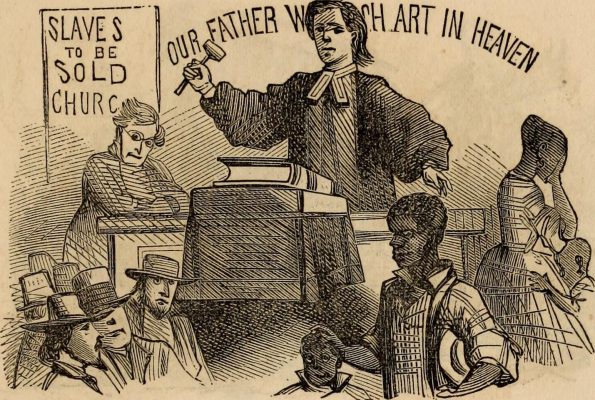
Romans 13, another Biblical verse used to justify slavery, was used more recently to separate illegal immigrant parents from their children at the U.S. border.
The Ku Klux Klan, a white-supremacist terrorist hate group was established in the wake of the Civil War. Organized in the Southern United States, it attempted to overthrow state governments in the South by targeted violence against African-American leaders and by intimidating voters. The KKK went through several versions over the years. Today it targets African-Americans, Latinos, Asian Americans, Native Americans, and Jews, as well as homosexuals, immigrants, leftists, Muslims, atheists, and Catholics.
Corporate America Steps In.
Between 1933 and 1939, President Franklin D. Roosevelt enacted the New Deal. This was an economic recovery plan to help the nation mend from the economic devastation caused by the Great Depression. Among its features were regulatory programs that incensed business leaders, who thought these reforms were overly burdensome. The leaders of some of the largest and most recognizable businesses in the country sought to undermine the New Deal’s regulations. They launched a corporate campaign targeting and funding religious individuals and groups who were against big government. The “Religion in American Life” campaign was conducted by the Ad Council in partnership with the best advertising agencies in America. The Ad Council began blanketing America with newspaper ads beginning in 1949. They promoted: (1) religion as the basis of American life, and (2) urged attendance in churches and synagogues.
According to Kevin M. Kruse, author of One Nation Under God: How Corporate America Invented Christian America, Americans claiming church membership skyrocketed from 49% in 1940 to 69% by the end of the 1950s. With the help of Billy Graham and other evangelistic conservative clergymen, these corporate leaders helped get Republican Dwight D. Eisenhower elected for two consecutive terms beginning in 1952 and ending in 1961. Between 1952 and 1956 Congress saddled Americans with most of the political piety you are likely familiar with:
- 1952—National Day of Prayer
- 1953—The National Prayer Breakfast
- 1954—“In God We Trust” placed on a U.S. postage stamp for the first time.
- 1954—“Under God” was added to the previously secular Pledge of Allegiance.
- 1955—Eisenhower signed a bill placing “In God We Trust” on paper currency.
- 1956—“In God We Trust” was officially adopted as the U.S. national motto. This replaced the previous de facto national motto “from many, one” (E Pluribus Unum).
Kruse writes:
During the Eisenhower era Americans were told, time and time again, that the nation not only should be a Christian nation but also that it had always been one. They soon came to believe that the United States of America was ‘one nation under God.’ And they’ve believed it ever since…Like most scholars, I believe that the historical record is fairly clear about the founding generation’s preference for what Thomas Jefferson memorably described as a wall of separation between church and state… History reminds us that our public religion is, in large measure, an invention of the modern era…we do violence to our past if we treat certain phrases—‘one nation under God,’ and ‘In God We Trust’—as sacred texts handed down to us from the nation’s founding. Instead, we are better served if we understand these utterances for what they are: political slogans that speak not to the origins of our nation but to a specific point in its not-so-distant past. If they are to mean anything to us now, we should understand what they meant then.
Who Invented the Anti-Abortion Lie?
According to Daniel K. Williams, history professor at the University of West Georgia, “The early political battles pitted Catholic antiabortion lobbyists against Protestant proponents of abortion law liberalization, with Republican legislators siding with the Protestants.” Williams continues, “Many Republicans supported the liberalization of state abortion law, believing that abortion law reform accorded well with the party’s tradition of support for birth control, middle class morality, and Protestant values.”
Billy Graham agreed, saying in 1968, “In general I would disagree with [the Catholic stance],” adding, “I believe in planned parenthood.” In 1967, Ronald Regan the then Governor of California signed into law the most liberal abortion law in the country. The 1971 convention of the Southern Baptists endorsed a resolution for the legalization of abortion to preserve the “emotional, mental, and physical health of the mother, as well as in cases of rape, incest, and ‘deformity.’”
In the 1973 Roe v. Wade decision, the U.S. Supreme Court ruled that the U.S. Constitution protects a pregnant woman’s liberty to choose an abortion, thus striking down many U.S. Federal and state abortion laws. Many religious and secular conservatives were delighted. W. Barry Garrett, Washington bureau chief of the Baptist Press, wrote the following after Roe v. Wade passed, “Religious liberty, human equality, and justice are advanced by the Supreme Court abortion decision.”
In 1974, the Southern Baptist Convention approved the resolution it had passed before Roe, calling it a “middle ground between the extreme of abortion on demand and the opposite extreme of all abortion as murder.” This resolution was approved again in 1976. After Roe passed, first lady Betty Ford, wife of Republican president Gerald Ford, praised it as a “great, great decision.” Barry Goldwater, who, during his Senate career was regarded as the “Grand Old Man of the Republican party”, initially hailed the passage of Roe, “I think abortion should be legalized because whether it is legal or not, women are going to have it done.” His wife Peggy was a founding member of Planned Parenthood in Arizona. A greater percentage of Republicans were pro-choice than were Democrats based on public opinion polls at the time. How in the world did the conservatives become the anti-abortion extremists they are today after they had so enthusiastically embraced abortion rights after Roe?
The impetus for conservatives to begin opposing abortion emerged after the Internal Revenue Service threatened to tax segregated private schools run by tax-exempt religious organizations. In Brown v. Board of Education (1954) the Supreme Court outlawed segregated public education facilities for black people and white people at the state level. Some white families in southern states didn’t want to send their children to integrated schools. So, they created their own private segregated schools, which became known as “segregation academies.” In many cases they were affiliated with churches and other religious organizations. These religious schools and the organizations running them benefited from significant tax exemptions.
In the late 1970s, the IRS became a threat to the tax-exempt status of these schools and the religious groups running them. Jerry Falwell Sr. and many of his fellow white, southern conservative pastors were closely connected to segregated schools and universities, and were fearful that the Supreme Court might end their lucrative tax-exemptions. Among Falwell’s associates was Bob Jones Sr., founder of a college that became Bob Jones University, which practiced segregation. In an April 17, 1960, radio address, “Is Segregation Spiritual?,” he asserted “God is the author of segregation.” He stated that desegregationists were “Satanic propagandists” and “religious infidels” who are “leading colored Christians astray” with their “communistic agitation to overthrow the established order of God.”
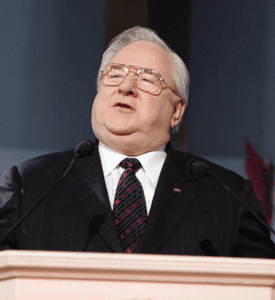
Enter Paul Weyrich, a religious conservative political activist and one of the key figures of the New Right. He wrote in the mid-1970s, “When political power is achieved, the moral majority will have the opportunity to recreate this great nation.” He was a cofounder of a networking organization consisting of social conservative activists that were once referred to by the New York Times as “a little-known group of a few hundred of the most powerful conservatives in the country.”
Weyrich recognized the threat that the IRS posed to Jerry Falwell Sr. and his associates over losing their tax benefits because their religious schools and universities were segregated and pledged the backing of the New Right to help them. But they had a problem. Weyrich understood that building a movement around defending the tax advantages of racist schools was not going to excite their Christian followers. They needed a message that would bring their movement together. They finally came up with a surprising word that would be the key to uniting their Christian base, “abortion.” It was only after leaders of the New Right had a conference call to discuss strategy that abortion was “cobbled into the political agenda of the Religious Right,” according to Linda Wertheimer, radio journalist for NPR.
Jerry Falwell Sr. was a Southern Baptist preacher, televangelist and founder in 1967 of a segregated school currently called Liberty Christian Academy, which became the still-segregated Liberty University in 1971, had been very active in conservative causes. Six years after Roe v Wade he began denouncing abortion, along with pornography and same-sex intimacy in his sermons. Falwell preached and wrote erroneously that abortion is murder.
According to historian Randall Balmer, author of Bad Faith: Race and the Rise of the Religious Right (2021), “It wasn’t until 1979—a full six years after Roe—that evangelical leaders, at the behest of conservative activist Paul Weyrich, seized on abortion, not for moral reasons, but as a rallying-cry to deny Democratic President Jimmy Carter a second term. Why? Because the anti-abortion crusade was more palatable than the religious rights real motive: protecting segregated schools.” Balmer had been invited to a conference in Washington D.C. that was sponsored by a religious right organization. There Weyrich reminded the attendees of the facts.
Balmer relates, “Let us remember, he said animatedly, that the religious right did not come together in response to the Roe decision. No, Weyrich insisted, what got us going was an attempt on the part of the Internal Revenue Service (IRS) to rescind the tax-exempt status of Bob Jones University because of its racially discriminatory policies.” During a break in the proceedings, Balmer says, he cornered Weyrich to make sure what he heard was correct. “He was adamant, that, yes, the 1975 action by the IRS against Bob Jones University was responsible for the genesis of the Religious Right in the 1970s.” In his book, Balmer cites three other prominent political activists involved in this issue that were on record as saying it wasn’t the Roe decision, but rather the IRS actions against segregated schools that started the anti-abortion movement.
Medical evidence tells us that abortion is not murder. Fetuses cannot live unsupported for 21 weeks, even with a respirator, and they don’t have the brain connections to feel pain until at least 24 weeks. Abortion went from being beneficial to eventually becoming murder, simply through the power of political manipulation. Eventually, on Friday, June 24, 2022, the US Supreme Court overturned Roe v. Wade. This decision dismantled 50 years of legal protection and paved the way for individual states to curtail or outright ban abortion rights, which many have.
Religious Dogma Restricts Care in Hospitals
Roughly one in six hospital beds in the U.S. is in a Catholic-run medical facility. Catholic facilities are governed by a set of Ethical and Religious Directives (ERDs) laid down by the Vatican and codified by the U.S. Conference of Catholic Bishops. All employees of these hospitals and health care facilities are bound by these directives. Directive 52 prohibits anyone working in a Catholic-run facility from giving patients birth control preventatives. Directive 45 prohibits abortion. What many prospective patients don’t know is that many Catholic-run facilities either ban outright or are unwilling to perform a number of miscarriage-related procedures that the Church characterizes as abortion.
There is no official count of the number of pregnant women who have gone to Catholic hospitals and clinics when something goes wrong and were denied the medical care they needed. The American Civil Liberties Union came out with a report in 2021 titled, “How hospital policies delay and deny critical treatment for pregnant patients” (Report: Protecting Pregnant Patients). It explains the ways in which women experiencing pregnancy complications, including miscarriages, often do not receive the kind of medical care from Catholic facilities that non-Catholic facilities routinely offer.
The ERDs of the Catholic Church also aim to control the last days of life. Directive 61 states: “Patients experiencing suffering that cannot be alleviated should be helped to appreciate the Christian understanding of redemptive suffering [italics added for emphasis].” But a man dying of brain cancer in a Catholic hospice outside of Seattle in 2014 did not know about this Directive until it was too late. In 2008, Washington State voters had approved a “Death with Dignity” initiative that made it legal for physicians to provide aid in dying for people with terminal illnesses who have less than six months to live. The man knew that he likely faced dementia and complete incapacity, certainly followed by a painful end. He must have known about the initiative, and repeatedly asked his physician and staff for help, but they refused to give him any information.

This was because the hospice was affiliated with Providence Health & Services, a Catholic health care network that adheres to the ERDs. His nurses believed they would be fired if they answered his questions because Providence has a specific policy that prevents referrals in connection with the Death with Dignity Act, or even discussions with patients about it. This cancer patient was somehow able to get a gun into the hospice, which he used to kill himself. I know about this story only because one of the nurses was so badly traumatized that she filed a complaint with the state’s Department of Health.
How many patients seeking care at Catholic facilities have any idea that these facilities use religious dogma to guide their protocols of care? Patients may not know when they are being denied treatment on “ethical and religious grounds.” Hospitals are not required to explain that they are denying care nor to explain why or inform patients of other options. Obviously, the Ethical and Religious Directives do not prohibit deceiving patients.
More Christian Nationalist Propaganda: The Lie that “America is a Christian Nation”
The forces that have been controlling white evangelicals with the abortion lie have also been manipulating them with the egregious falsehood that “America is a Christian country.”
The Founding Fathers and the U.S. Constitution Established Religious Freedom
Christian Nationalists suppress the truth that the United States has always been a pluralistic society. When it comes to religion, the United States is first and foremost a country founded on the principals of freedom for religion and freedom from religion. The constitutional framework that enables political pluralism in the United States also supports the existence of a variety of religious traditions. The first amendment to the U.S. Constitution ensures the free exercise of all religious beliefs, “Congress shall make no law respecting an establishment of religion, or prohibiting the free exercise thereof.” This amendment forms the textual basis for the Supreme Court’s interpretations of the “separation of church and state” doctrine.
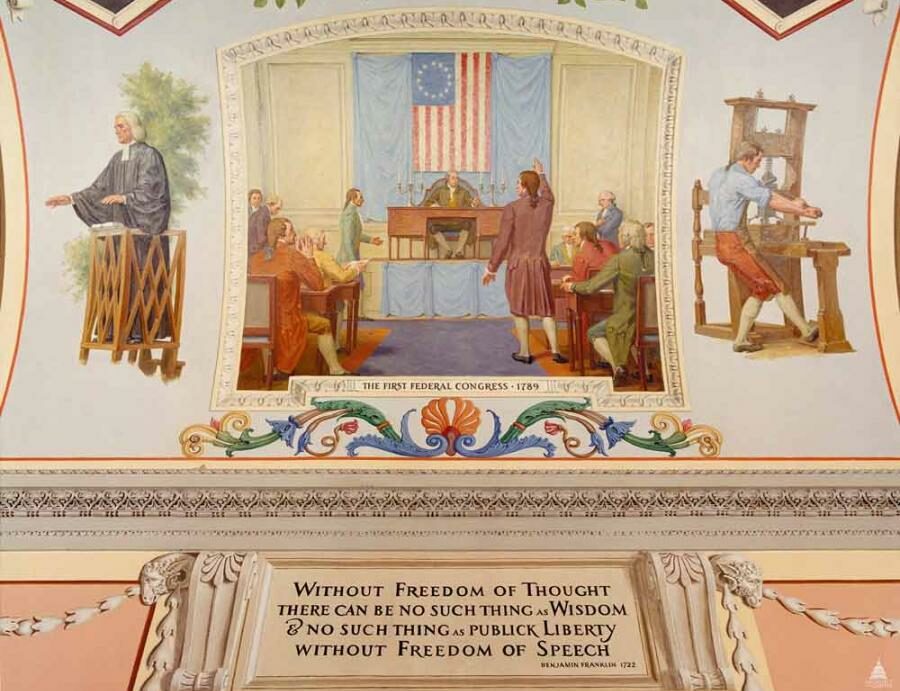
Here is what the Founding Fathers said about this guarantee of religious freedom:
- John Adams, 2nd U.S. President (1735-1826)
In his A Defence of the Constitutions of Government of the United States of America (1787): — “It will never be pretended that any person employed in that service had interviews with the gods, or were in any degree under the inspiration of heaven, more than those that work upon ships or houses, or laboring in merchandise or agriculture; it will be forever be acknowledged that these governments were contrived merely by the use of reason and the senses.”
In describing the struggle against the confederacy of “ecclesiastical and civil tyranny,” John Adams wrote, “It was the great struggle that peopled America. It was not religion alone, as is commonly supposed; but it was a love of universal liberty, and a hatred, a dread, a horror, of the infernal confederacy before described, that projected, conducted, and accomplished the settlement of America.”
- Benjamin Franklin, scientist, inventor, statesman, diplomat, and more (1706-1790)
Franklin’s response to a question posed to him at the close of the Constitutional Convention, “Well Doctor, what have we got, a republic or a monarchy?” Franklin’s response was legendary, “A republic, if you can keep it” (from res publica—a republic). A republic is literally a “public thing,” a thing of the people, as opposed to the divine, and is not something that could be maintained without effort by the people.
- Thomas Jefferson, 3rd U.S. President (1743-1826)
In his inaugural address, Thomas Jefferson, said, “…banished from our land that religious intolerance under which mankind so long bled and suffered.” Freedom was one of our founding principles. America’s founders deliberately eliminated religious intolerance. Asked whether minor points of division could ever be eliminated and uniformity attained, “Millions of men, women and children, since the introduction of Christianity, have been burnt, tortured, fined, imprisoned; yet we have advanced not one inch towards uniformity.”
In a letter to the Baptists of Danbury, Conn., Jefferson wrote, “Believing with you that religion is a matter which lies solely between Man & his God, that he owes account to none other for his faith or his worship, that the legitimate powers of government reach actions only, & not opinions, I contemplate with sovereign reverence that act of the whole American people which declared that their legislature should ‘make no law respecting an establishment of religion, or prohibiting the free exercise thereof’, thus building a wall of separation between Church & State. [italics added for emphasis]” Jefferson quoted the First Amendment, and added his famous metaphor.
In his Notes on the State of Virginia, Jefferson declared that rather than “putting the Bible and Testament into the hands of the children, at an age when their judgments are not sufficiently matured for religious inquiries, their memories may here be stored with the most useful facts from Grecian, Roman, European and American history.”
In a letter to William Short about the Bible, Jefferson wrote, “I have many passages of fine imagination, correct morality, and of the most lovely benevolence; and others again of so much ignorance, so much absurdity, so much untruth, charlatanism, and imposture, as to pronounce it impossible that such contradictions should have proceeded from the same being.”
- James Madison, 4th U.S. President (1751-1836)
In a letter to Edward Livingston, Madison wrote, “And I have no doubt that every new example will succeed, as every past one has done, in shewing that Religion & Govt. will both exist in greater purity, the less they are mixed together.” Expounding on religious violence, Madison noted the “torrents of blood” that have been spilled trying to eliminate religious differences.
- Thomas Paine, political activist, philosopher, political theorist, and revolutionary (1737-1809)
In his The Age of Reason, Paine wrote, “Those men, whom Jewish and Christian idolaters have abusively called heathens, had much better and clearer ideas of justice and morality than are to be found in the Old Testament, so far as it is Jewish; or in the new.”
Thomas Paine on Christianity, wrote, “No country can be called free which is governed by an absolute power.” Paine argued that blind obedience to and fear of an omnipotent being is not freedom, but tyranny. At its core, Judeo-Christianity’s insistence on fear and obedience is diametrically opposed to America’s essential value.
The United States Constitution is America’s supreme law. To reiterate, it states, “Congress shall make no law respecting an establishment of religion, or prohibiting the free exercise thereof.” A primary claim by the Christian Nationalism movement is that America was founded as a Christian nation. Not only is that refuted by the Constitution, it also contradicts the Treaty of Tripoli that was negotiated under President George Washington and signed by President John Adams with unanimous consent of the U.S. Senate in 1797, which specifically says that “the Government of the United States of America is not, in any sense, founded on the Christian religion.” [italics added for emphasis]
The “Declaration of Independence” Smokescreen
Christian Nationalists argue that the Declaration of Independence incorporates Judeo-Christian principals because it contains four generic references to a higher power. Firstly, “higher power” in no way refers to any god, much less the Christian variant of god. Furthermore, the Declaration did not establish a new nation, legal system or new government. It did not create anything; it was simply an announcement to end the political ties that connected the colonies to Great Britain. It was the Constitution, not the Declaration, that created our government and laws.
More than a century ago, Carl Becker, an American historian who wrote an important analysis of the concepts expressed in the Declaration (The Declaration of Independence: A study in the History of Political Ideas, 1922) states, “The primary purpose of the Declaration was not to declare independence, but to proclaim to the world the reasons for declaring independence. It was intended to formally justify an act already accomplished.” The Declaration justified American independence from an authoritarian monarchy in terms of the signers’ political philosophy: governments are formed by and for the people. Eleven years later this was enshrined in the first three words of the Constitution: “We the People.”

The Intrusion of Religion into Federal Slogans
In the middle of our nation’s crisis in the Civil War, a preacher and two Christian government officials took advantage of a distracted, fearful nation to promote their personal religion. The mint director was able to get “in God We Trust” stamped on U.S. coins. More religion was injected into the government nearly a century later. This occurred during the first years in the Eisenhower administration at the height of the Cold War with the threat that communism and nuclear death posed to both Christianity and capitalism. As mentioned earlier, with Billy Graham’s help, the Eisenhower administration placed ‘In God We Trust” on stamps and paper currency for the first time, made it the official national motto, and added “Under God” to the previously secular Pledge of Allegiance. All this happened within a three-year time span (1954-1956). At the time over 90% of the population were Christians, who may have felt that it was a good time to have God on their side in light of the communist threat.
The previous de facto U.S. motto was E Pluribus Unum—“from many, one.” The government effectively replaced the longstanding motto of unity to one that is divisive. In 2022, 37% of Americans are non-Christian. Christians injecting their religious beliefs in the form of political slogans onto coins, currency and stamps does not make America a Christian nation, though the Christian Nationalists would like you to think otherwise.
Masquerading an Ethical Principal as Christian Morality
Among the many claims that Christian Nationalists make in their assertion that America is a Christian nation, perhaps the most arrogant, is that our country was founded on the Golden Rule. The most familiar version says, “Do unto others as you would have them do unto you.” The Golden Rule is not a Judeo-Christian-specific principal; it is much-reputed to be the most culturally universal, ethical principal in human history, and reportedly dates back to early Confucian times (551-479 BCE). According to Rushworth Kidder, the Golden Rule appears prominently in Buddhism, Confucianism, Hinduism, Judaism, Islam, Taoism, Zoroastrianism, and “the rest of the world’s major religions,” including Christianity. Simon Blackburn also says that the Golden Rule can be “found in some form in almost every ethical tradition.”
Falsifying British History as American History
Much of the history that Christian Nationalists cite is from a time when the country was ruled by the British. The American colonies did possess governments’ foundation based on Christian principals and the Bible. The colonies were all part of the British Empire, which was controlled by a Christian king who headed his religion, the Anglican Church. The Anglican Church had little tolerance from competing denominations, especially Quakers and Presbyterians. The Anglicans were penalizing their followers for not baptizing their children as Anglicans, and making it a criminal offense for Quakers to enter the state. In Thomas Jefferson’s Notes on the State of Virginia, query 17, he urges the abolition of such tyrannical laws.
To argue that the United States is a Christian nation based on its British colonial history is a falsehood promulgated by the Christian Nationalists. When the founders were creating the United States of America, they rejected the examples of colonial governments established on Judeo-Christian values. These were, in fact, examples of what the founders wanted to avoid.
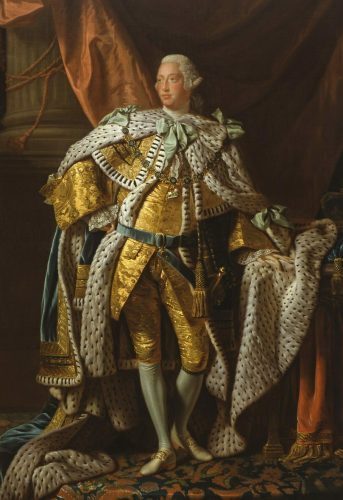
The Bogus “Judeo-Christian Ten Commandments” Argument
The Christian Nationalists take care to say that our country is founded on Judeo-Christian principals, as opposed to merely Christian principals. Judeo-Christian means religious writings, beliefs and traditions held in common with Judaism and Christianity. Jewish tradition states that there are 613 commandments in the five books of the Torah in the Hebrew Bible, which includes the two different sets of Ten Commandments.
Christian Nationalists argue that America was founded on the Ten Commandments, and that they are the basis of American law and morality. This assertion is false. The Ten Commandments and the other mosaic laws are not a moral code; they are a religious code, enforcing conformity, not morality.
“Every one of the ten would be considered unconstitutional in our system—every single one, including the commandments against killing and thievery. The Ten Commandments conflict with our American principals so completely that they alone of the 613 amply prove that our nation is not founded on Mosaic Law.” — Andrew L. Seidel, constitutional attorney at the Freedom from Religion Foundation and author of The Founding Myth: Why Christian Nationalism is Un-American. When Seidel has asked the people that are promoting this falsehood which of the Ten Commandments were so influential on American law, they have refused to answer.
Nevertheless, the separation of church and state that is incorporated in the First Amendment of the Constitution protects the rights of American Christians (and other religious groups) to follow the Ten Commandments. They also have the right to attend the church (or synagogue, mosque, and so forth) of their choice.
Misappropriating Language
More insights into the deceptive practices of Christian Nationalists are revealed by Anne Nelson:
The [Christian Nationalist] movement has also appropriated a vocabulary that it redeploys with Orwellian flair. ‘Family’ is a code word for homophobic, and ‘defense of marriage’ means prohibition of same-sex unions. ‘Fairness’ and ‘justice’ mean lowering taxes for the wealthy and corporations. ‘Values’ means conservative evangelical ideology. ‘Right to work’ means depriving unions of the benefits of collective bargaining. The movement’s brand of ‘religious freedom’ often disparages other beliefs, and would allow fundamentalist churches to support political campaigns while preserving their tax-exempt status. (Shadow Network: Media, Money, and the Secret Hub of the Radical Right)
Nelson adds, “… ‘educational reform’ means redirecting public school funding to religious schools, charter schools, and homeschooling. All of these euphemisms promote policies that victimize low-income and minority populations.”
Summary of “America is a Christian Nation” Brainwashing
The nationalist forces that control their white evangelical Christian followers have been attempting to build their “America is a Christian Nation” case by propagandizing justifications that are both false and immaterial. Some of these include claiming that the history of the thirteen British colonies is American history; insisting that the Declaration of Independence is relevant to the constitutional government of the United States; claiming that the Founding Fathers were Christians (many were Deists); citing post-constitutional presidents that were Christian; pointing to modern political slogans on coins, currency, and stamps; referring to the Golden Rule as if it were a uniquely Christian value; and asserting falsely that America was founded on the principles of the Ten Commandments. When it suits their political goals, Christian Nationalists conveniently ignore the Constitution of the United States. The one part they universally proclaim is the second amendment, which they interpret outside of its historical context.
Organizations Counteracting Christian Nationalism
Christian organizations, as well as secular nonprofit organizations, that are alarmed at the threat of Christian Nationalism, have formed or have revitalized existing organizations to counter this movement. Among these are:
- BlitzWatch was formed to counter the Christian Nationalism “Project Blitz” campaign of inundating state-level politicians with model bills, proclamations, and talking points through its legislative guide. The BlitzWatch website monitors and reveals a part of the effort that is being made to turn America into a Christian patriarchy. In 2019, a coalition of 43 religious and allied organizations, including the National Council of Churches, the Anti-Defamation League, the Hindu American Foundation, and the Center for Inquiry, issued a statement directed at state lawmakers opposing “Project Blitz” and similar legislative efforts.
- Faithful Democracy is part of the Washington Interfaith Staff Community (WISC), a network of over 70 national religious bodies and faith-based organizations including the National Council of Churches.
- Declaration for American Democracy, an anti-oppression coalition working together to make the promise of democracy real, has more than 230 member organizations.
- In 2018, the American Academy of Arts and Sciences created a two-year bipartisan Commission on the Practice of Democratic Citizenship: Our Common Purpose, with more than 50 participating organizations. The commission was created, “to explore how best to respond to the weaknesses and vulnerabilities in our political and civic life and to enable more Americans to participate as effective citizens in a diverse 21st-century democracy.”
- Americans United for Separation of Church and State uses high-impact litigation, powerful lobbying, and grassroots advocacy to protect, the wall of separation between church and state.
- Christians Against Christian Nationalism is an ecumenical organization sponsored by leaders of many Christian denominations. Their mission statement includes the following:
…Today, we are concerned about a persistent threat to both our religious communities and our democracy — Christian nationalism. Christian nationalism …often overlaps with and provides cover for white supremacy and racial subjugation. We reject this damaging political ideology and invite our Christian brothers and sisters to join us in opposing this threat to our faith and to our nation. …
- Vote Common Good is, “inspiring, energizing, and mobilizing people of faith to make the common good their voting criteria. And, we train and support Democratic candidates to connect with Evangelical and Catholic voters.”
- Multi-Faith Neighbors Network (MFNN) is an ecumenical organization, founded by Pastor Bob Roberts Jr., Imam Mohamed Magid, and Rabbi David Saperstein. The MFNN website explains its mission as follows:
“MFNN coordinates grassroots movements with religious leaders across various faith traditions, while never sacrificing each faith tradition’s unique theological identity. Working cooperatively, even in the midst of often irreconcilable theological differences, faith leaders mobilize their congregations to serve their communities in order to model the kind of society that all of us are trying to build – one where community, cooperation, and the common good are lived out.”
Publications: Complementary Peacemaker’s Tools
Video: How some evangelical leaders are combating political radicalization in their congregations (PBS NewsHour)
A Closing Thought on Christian Nationalism
Christian Nationalists have successfully convinced far too many Americans to believe their lies. They are claiming a nation that is dedicated to the freedom of and from religion for their own particular religion.
Their operatives are hard at work redrawing political district maps to swing votes in their favor. They are taking drastic means to suppress voters and other abuses of the electoral processes that continue to undermine American democracy. Addressing these issues is central to meeting the challenge of countering Christian Nationalism. That which restores the power of people to govern themselves undermines the pretensions of those who wish to dominate us in the name of their version of God.
Christian Nationalists are using the tools of democratic political culture to end democracy. A small ultra-wealthy group of people is attempting to control the social order for its own benefit. If you care about democracy and freedom, please reflect on John F. Kennedy’s conviction, “I believe in an America where the separation of church and state is absolute…” And heed the words of James Madison who warned Americans to take “alarm with the first experiment on our liberties.”
History teaches us the dangers of a religious institution controlling a society. After the fall of the Roman Empire in the 5th century, the Roman Catholic Church filled a power vacuum over much of the land we know as Europe. It imposed its brand of Bible-based Christianity on the people for about a thousand years until the Protestant Reformation. Much of this-time period is often referred to as the “Dark Ages.”


